MercoPress. South Atlantic News Agency
Tag: Fidel Castro
-
Thursday, April 19th 2018 - 22:24 UTC
Miguel Díaz-Canel becomes the new president of Cuba: there is no chance of a Trojan horse
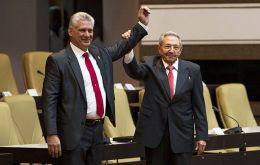
Miguel Díaz-Canel has been ratified on Thursday by the National Assembly of Cuba as the new president of the Council of State, the country's first leader in practice. The parliament ratified the former vice president with 99.83% of the votes of the deputies present. Diaz-Canel replaces the General Raúl Castro, who retires from power after 12 years at the head of the country. However, the new president clarified that Raúl Castro “will lead the most important decisions” for the country.
-
Wednesday, April 18th 2018 - 07:37 UTC
Who is Miguel Díaz-Canel who is expected to lead Cuba after 60 years of the Castro dynasty
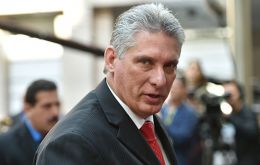
Cuba is set to undergo a historic shift this week, elevating a relatively unknown Communist Party official to replace retiring President Raúl Castro. But who is Miguel Díaz-Canel? And what does his ascension to the top of Cuba's government mean for a country that has been run by the Castro brothers for nearly 60 years?
-
Monday, March 12th 2018 - 09:43 UTC
Raul Castro succession process takes off; heir apparent blasts US for “resuming a Cold War rhetoric”
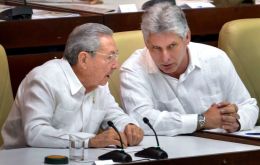
Cuba Vice President Miguel Diaz-Canel, tipped to succeed President Raul Castro, accused the US yesterday of “resuming a Cold War rhetoric” and of “attacking” the Cuban revolution. Diaz-Canel spoke to state television after casting his vote in elections for a parliament that will choose Castro’s successor on April 19.
-
Tuesday, May 2nd 2017 - 06:30 UTC
End of an era in Cuba? Last of a May Day celebration without a Castro brother
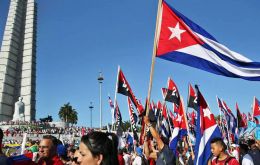
The Cuban government's traditional May Day parade Monday is the last to be overseen by President Raul Castro, and the first without his late brother and revolutionary predecessor Fidel.
-
Saturday, December 3rd 2016 - 09:27 UTC
'Cuban' Maradona warns Macri might not make it past Christmas Day
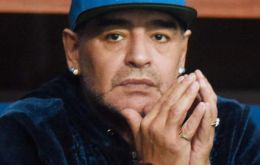
Argentine retired football player Diego Maradona, in Cuba to attend the funerals of his friend and former revolutionary leader Fidel Catro, hinted that should the people of his country choose to take to the streets, President Mauricio Macri might not be in office by Christmas.
-
Wednesday, November 30th 2016 - 12:04 UTC
Putin an “emblem of struggle for the mutlipolar world,” says Maduro

“Putin's victories are our victories,” Venezuelan President Nicolas Maduro told Russia's State Duma Speaker Vyacheslav Volodin on Tuesday during funerary ceremonies in Havana to mark the passing away of former Cuban leader Fidel Castro.
-
Tuesday, November 29th 2016 - 09:47 UTC
No music to mark American Airlines landing in Havana
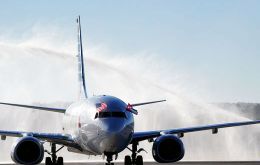
Passengers from Miami, wearing straw hats provided by American Airlines with the word “Cuba” on the back, were greeted with welcome signs in various languages, but no music as the first scheduled commercial flight from the US to Havana in more than 50 years landed Monday to the applause of passengers and a water-spraying salute from firetrucks.
-
Monday, November 28th 2016 - 07:54 UTC
Reactions to Fidel Castro's legacy: as controversial as in life
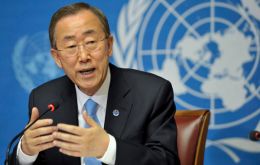
World reactions to the death of the Cuban Revolution leader Fidel Castro who ruled the island for half a century have been as controversial as his life and influence in world affairs. “His revolutionary ideals left few indifferent”, Ban Ki-moon was quoted, and Pope Francis was more diplomatic and referred to the sad news and promised prayers to Cuba's patron Virgin.
-
Monday, November 28th 2016 - 07:40 UTC
Malvinas Argentine sovereignty was always promoted by Fidel Castro
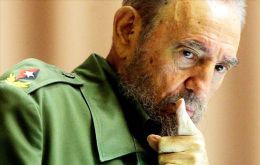
Despite the political changes experienced by Argentina during the XXth century, the leader of the Cuban Revolution, Fidel Castro always supported Argentine sovereignty over the Falkland/Malvinas Islands in international forae and in public statements, it has been recalled in Buenos Aires.
-
Saturday, November 26th 2016 - 09:52 UTC
Fidel Castro has died at the age of 90; hero and bastard, revolutionary and dictator

Fidel Castro, the fiery communist politician and Cuban revolutionary who led his country for almost half a century, has died. His health had been deteriorating since 2006, when he suffered from intestinal bleeding. He was 90 years old.
